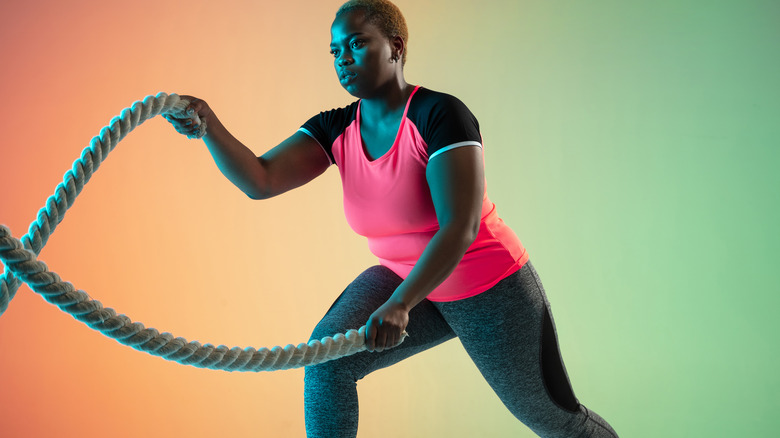Should You Do Cardio Or Lift Weights First?
You probably know that a healthy exercise regimen includes cardio and strength training. Cardio is rewarding because it builds endurance, strengthens your heart, increases bone density, and reduces stress. It also decreases the risk of heart disease, high cholesterol, and high blood pressure, per Verywell Fit. You have several options when it comes to cardio, and they include everything from brisk walking to bike riding.
Lifting weights, or strength training, also has benefits including increasing muscle and bone strength, reducing your risk of injury and falls, and improving mobility. It can even improve your mood, increase self-esteem, and protect your brain against cognitive decline (via Healthline). You don't have to lift heavy weights when you strength train. In fact, you can always opt for bodyweight exercises, such as squats, lunges, planks, push-ups, and bird-dogs if you don't want to lift weights.
But is there a specific order when it comes to cardio and weight training? Turns out there is, and the answer might surprise you.
You should consider your goals
The American Council on Exercise (ACE) points out that a few factors are at play when considering this question, and perhaps the most important is your goal. For example, if your main goal is to lose weight or build muscle, you might benefit from strength training first. If you're looking to improve your endurance, then do cardio first. If you are working your lower body muscles to improve strength, getting that out of the way first might be more beneficial because your muscles may become fatigued if you do cardio first. If you have general fitness goals with no specific emphasis on strength or endurance in mind, ACE recommends doing what you enjoy least first.
Furthermore, your mindset also makes a difference. For example, if you don't enjoy cardio, you can do it first and get it out of the way. If you dislike lifting weights, it might pay off to do that first so you can enjoy your cardio session. ACE also points out that your goals may change over time, and you should always adjust your exercise routine to meet them.


